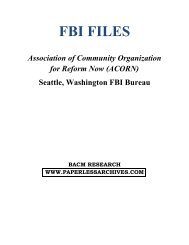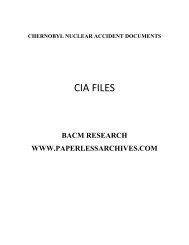national security agency journal articles world war ii german ...
national security agency journal articles world war ii german ...
national security agency journal articles world war ii german ...
You also want an ePaper? Increase the reach of your titles
YUMPU automatically turns print PDFs into web optimized ePapers that Google loves.
UNCLASSIFIED<br />
a division. At the higher echelons, where orders live<br />
longer and therefore allow more time for encipherrnent,<br />
the proportion of cryptograms increased, until at the top,<br />
practically all messages were enciphered. They were<br />
obviously of far greater importance than those in clear.<br />
To get to their contents, the Germans had to crack open<br />
their cryptographic armor. As the enemy improved his<br />
cryptographic protection during the <strong>war</strong> and extended it<br />
to more classes of messages, the German army's<br />
cryptanalytic establishment grew to keep pace.<br />
The Main Intercept Post had only a handful of<br />
cryptanalysts at the beginning of the <strong>war</strong>-five for all<br />
Britain, for example. By 1942, it had 200, divided into<br />
country sections and such service sections as those for<br />
Hollerith machine processing and for archives. It attacked<br />
not only the enemy high command systems but also those<br />
unsolvable by field echelons, which worked on the<br />
simpler cryptosystems of the enemy units on their level<br />
opposite them.<br />
At first the Germans had relatively good success with<br />
the Russian codes. The solved messages, said the<br />
cryptanalysts of Army Group North in 1944, "contain<br />
operational combat reports, statements about assembly<br />
areas, command posts, loss and replacement reports,<br />
reports about chain of command and positions prepared<br />
for the attack (e.g., messages of the 122nd Armored<br />
Brigade on 14 and 17 February)." These results came<br />
from only a small proportion of the intercepts. In the<br />
thirteen months from 1 May 1943 to 31 May 1944,<br />
Army Group North intercepted 46,342 Russian<br />
cryptograms. It solved 13,312, or less than one in four.<br />
Its commander of communications reconnaissance<br />
explained why:<br />
"It is only infrequently possible to get enough<br />
identically enciphered messages from the same net to be<br />
able to solve the current systems." Later he adduced<br />
additional reasons:"... a growing complication in the<br />
systems used by the enemy ... a greater care in<br />
enciphering ... (avoidance of identical addresses and<br />
signatures; names and phrases with characteristic endings<br />
and patterns, which must be given in code form in<br />
individual letters or syJlables, were either enciphered<br />
abbreviated or were inserted in cleartext)."<br />
In other words, as Russian code construction and<br />
discipline improved, German cryptanalytic success<br />
declined. Whereas from May to August 1943 the Army<br />
Group North code breakers always solved more than 34<br />
percent of all intercepts, from January to May 1944, with<br />
even greater monthly volume, they never solved more<br />
than 33 percent. These almost never included the toplevel<br />
command systems. It was the same for the western<br />
Allies. In general, the Germans failed to read the<br />
messages moving in the higher command nets.<br />
The cryptanalysts passed their solutions CO the contents<br />
evaluators, who passed their conclusions in turn to the<br />
final evaluators. They combined these conclusions with<br />
those of the traffic evaluators. Often their analysis could<br />
precipitate precious observations. The evaluators of<br />
Intercept Company 3.jN.7 Ord company of<br />
Communications (Nachrichten) Battalion 7) did so for<br />
the 11th Army in March of 1942.<br />
In its drive to conquer the Crimea, the 11th Army had<br />
split the Russian forces on that peninsula. It had penned<br />
some in Sevasropol in the west; it had not yet swept away<br />
those in the eastern portion, an elongated peninsula<br />
ending in the city of Kerch. These Russian eastern forces,<br />
controlled by the Crimean Front, continued to assemble<br />
troops for a counteroffensive. The intercept company<br />
concentrated much of its effort at determining the<br />
composition of these forces, since this would help the<br />
Germans know how many of their own troops they might<br />
have to use to repel the Russian attacks in their rear.<br />
This was the situation when, at 7: 16 a.m. on 13<br />
March, the company intercepted a message to an<br />
unknown radio station with call sign SOTD. It was<br />
addressed "To the chief of communications of the 44th<br />
Army." This indicated pretty clearly that SOTO was the<br />
44th Army, and since company's records showed that<br />
direction-finding had located SOTO transmitting from<br />
near Kerch, the company could report a few hours later to<br />
the intelligence officer of the 11th Army, .. 44th<br />
Army definitely on the Kerch Peninsula." It was one<br />
more element in his picture of the enemy.<br />
Though these chains of hypotheses might seem to have<br />
led to freq uent error, constant observations corrected<br />
wild reasoning and kept the results close to the facts. A<br />
few days after the intercept comr.any identified the 44th<br />
Army, it assigned radio station OPWCH {O the air staff<br />
of the enemy's 51st Army on the similar basis of a message<br />
address. But the following day, it recognized that the net<br />
to which OPWCH belonged was in fact identical to a net<br />
of the 44th Army .. according to the net construction,<br />
frequency notifications, and statements of the<br />
monitoring radiomen." OPWCH was therefore a station<br />
of the 44th Army, the company concluded, and had<br />
probably merely accepted the message for for<strong>war</strong>ding<br />
tothe51stArmy.<br />
Through such detailed and often wearisome activity,<br />
German radio intelligence units contributed enormously<br />
UNCLASSIFIED 7
















